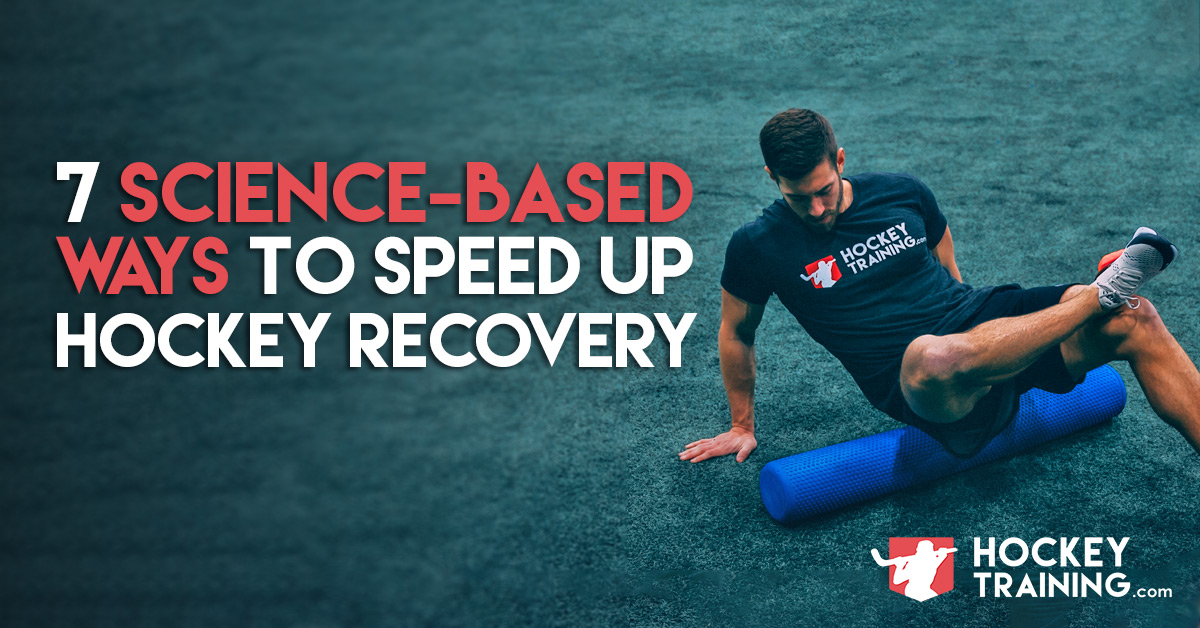You know that feeling you get when you have an amazing workout or game?
Your body aches, you’re having trouble walking, and you’re cursing your legs every few seconds of the day?
Despite the euphoric feelings of accomplishment, this is your body telling you that it’s broken down and that it needs time to recover before it is going to be able to emit that type of physical exertion again.
This muscle recovery phase post-workout or post-game is what determines whether or not you are going to build muscle and strength, and whether or not you are going to re-energize them for your next workout/game.
Recovery is everything, and we all know how important it is.
But, sometimes our bodies don’t heal as fast as we would like them to, especially if we have a game the next day!
This is exactly why I put this list together today, to give you a “go-to” resource that you can use when you want to jumpstart your recovery so you can guarantee for sure that you will be entering the ice at 100% capacity and not just 50-80%.
#1: Sleep At Least 8 Hours
You can ever underestimate the importance of a good night’s sleep, I wrote an entire blog on it for that reason.
If you’re one of these athletes who thinks that “I only need 5 hours” — let me tell you something… you couldn’t be more wrong.
You’re not giving your body and mind the time it needs to repair and rebuild, so not only are you negating your own performance and progress, but you’re also putting yourself at a greater risk for injury too.
Getting sleep is the most important thing you could ever do for recovery, so aim for a minimum of 7-8 hours per night.
#2: Get Your Water Intake Correct
Dehydration is one of the most prevalent issues in hockey athletes today that has an immediate impact on how well they can perform.
Keeping hydration levels high helps fuel physical performance, fuel mental performance, and helps prevent fatigue.
Dehydration has been associated with fatigue many times over within the research, it’s a shut case. Make sure you’re drinking at least 0.5oz per 1 pound of body weight per day.
E.g. A 200 pound athlete would have a minimum intake of 100oz of water per day.
#3: Total Daily Protein Intake Matters
The research is very clear that your daily protein intake determines very greatly how well, or how not well, you are going to be able to recover from intense exercise.
If you’re reading between the lines here, you’re seeing that I didn’t just say “have a post-workout protein shake” — no. Your daily total is what matters most.
Make sure you’re eating 4-6 meals per day and consuming 1-2 palm size servings of complete protein with each meal.
#4: Get A Massage
Getting a massage is up there with one of the best science-based recovery strategies you could ever do.
When you get a massage, it helps break up scar tissue and ease muscle pain. Beyond this, there is also a calming effect to it that helps your psychology calm down as well by reducing anxiety.
If you are too cheap to pay for massages, trade massage-for-massage with your significant other. In the name of hockey, of course!
#5: Drink Tart Cherry Juice
Recovery tip nobody ever talks about: Drink tart cherry juice in the evening.
Tart cherry juice has been demonstrated to reduce muscle soreness and reduce the inflammation in your joints associated with intense physical exercise.
Beyond this, tart cherry juice has also been demonstrated to improve melatonin levels in the brain leading to a better sleep quality.
Having an impact on your muscles, connective tissue, and nervous system (via sleep) — tart cherry juice is a recovery monster.
Have a glass of it (preferably organic, you’ll be able to find it at a local health store) within 60-mins of bedtime and enjoy!
#6: Take A Nap!
Don’t be afraid to take a nap during the day, some of the strongest athletes of all time have all advocated how important a nap each day was to their performance and recovery.
According to the research, getting a nap in approximately 2 hours after your training session helps the body enter a deep, restorative sleep.
Keep it quick, a power nap of 20 minutes is more than enough to maximally enhance your recovery processes but short enough to where it won’t negatively impact your sleep at night.
#7: Game Day Nutrition Matters
Physical activity exertion creates many different macro- and micronutrient shifts in the body.
In order to ensure we take advantage of these shifts to support performance and recovery, we need to have our game day nutrition on lockdown.
If you are somebody who is just “winging it” when it comes to your game day nutrition, then reading this article might be the next most powerful thing you do towards becoming a better hockey player.
Final Thoughts
I have a saying that I always repeat to the VIP members of HockeyTraining.com in our monthly video Q/A’s, and it’s:
You aren’t what you can do, you only are what you can effectively recover from.
Too many athletes focus on their output, but they completely forget that it’s 100% dictated by their input.
When you master your input, you master your recovery, and when you master your recovery, you master your hockey performance.

